Asia-Pacific nations call for renewed focus on the Women, Peace and Security agenda at UN Security Council
Date:
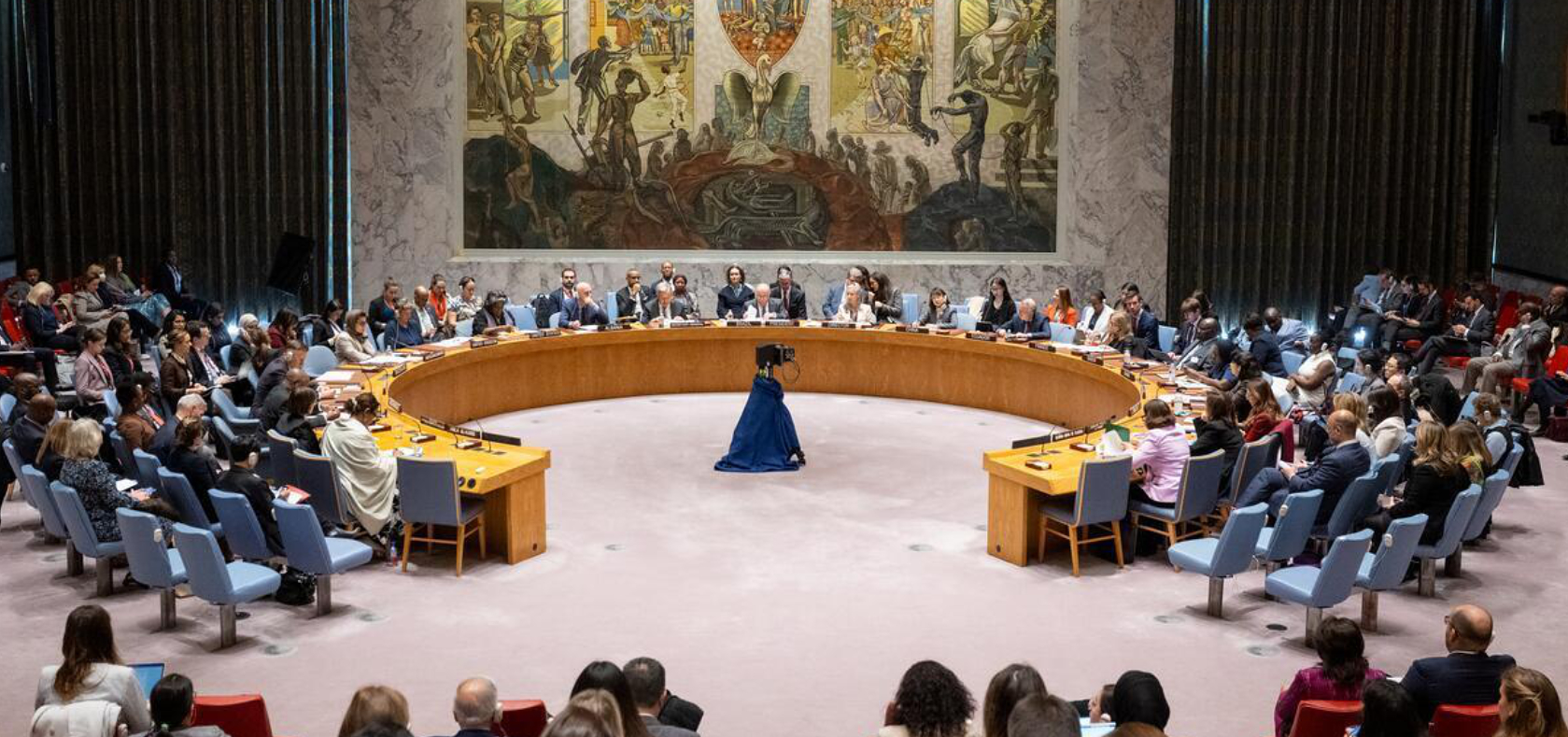
UN Member States from Asia and the Pacific have added their voices to the global call for renewed efforts to strengthen women's participation in international peace and security by translating theory into practice under the Women, Peace and Security (WPS) agenda.
This took place during the annual UN Security Council open debate on WPS held in New York on 25 October 2023, which included briefings by Australia, Bangladesh, China, Indonesia, Japan, Malaysia, Mongolia, Philippines, Republic of Korea, Thailand, Tonga and Viet Nam.
UN Women is the lead UN entity on the WPS agenda in the Asia-Pacific region and has been supporting governments and civil society to develop and implement National Action Plans on WPS.
The annual open debate was an opportunity to reflect on implementation efforts for the four pillars set out in Security Council Resolution 1325: participation, protection, prevention and relief and recovery.
During her briefing, UN Women Executive Director Sima Bahous presented the 2023 report of the UN Secretary-General on WPS and appealed for urgent, transformative action.
“Around the world and across its crises and conflicts, women continue to risk their lives. They are caring for those around them, trying to carry their families, communities and nations to peace. They are showing us what to do and I commend their example, as I commend the Secretary-General’s report to you, as motivation, inspiration and a source of determination for change,” said Bahous.
Summary of key points by Asia-Pacific countries during the open debate
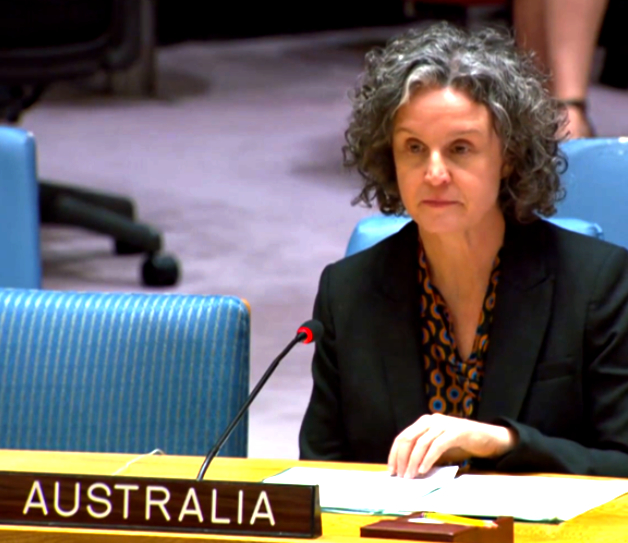
Australia urged countries to embrace the transformative nature of the WPS agenda. "The Secretary-General has called on us to elevate the voices of diverse women and girls, prevent gender-based violence, innovate in our programming, resource actions and support women human rights defenders. Individually and collectively heeding this call, we can deliver on our shared commitment to all four pillars of the WPS agenda and in the conflicts that cost too many lives,” said Rebecca Bryant, Australia’s Deputy Permanent Representative to the UN.
Rebecca Bryant, Deputy Permanent Representative of Australia to the United Nations. Photo: Screenshot/United Nations
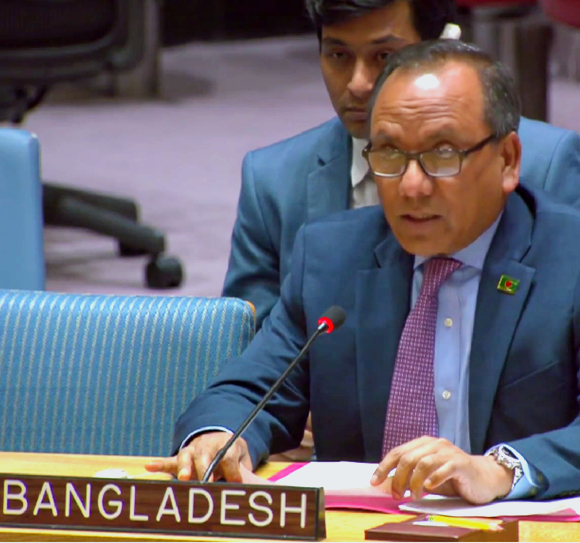
A painful legacy inspired Bangladesh to play a key role in the adoption of Resolution 1325 in 2000, recalled Ambassador Muhammad Abdul Muhith, their Permanent Representative to the UN. “In order to advance full realisation of the WPS agenda, it is critical to develop and apply an effective compliance mechanism at the country level. In this regard, we welcome the initiative of UN Women to develop a tracker that monitors trends across a set of indicators by tracking women’s participation in peace processes globally and the gender-responsiveness of the peace agreements,” said Muhith.
Ambassador Muhammad Abdul Muhith, Permanent Representative of Bangladesh to the United Nations. Photo: Screenshot/United Nations
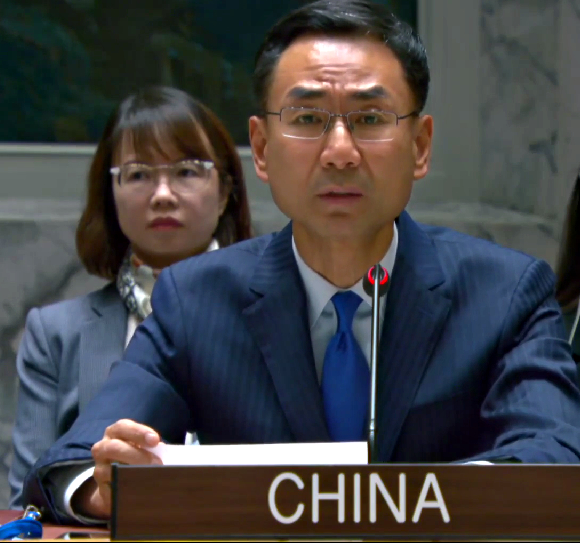
China underscored the importance of cooperation and partnership. “Delivering on the commitments of the WPS agenda cannot be done without strong input from the entire UN system and other international and regional partners. We hope UN Women, UNDP and other organisations will further enrich and improve the toolbox and roadmap for women development so as to effectively address the challenges women face, including poverty, discrimination, violence and gender-based digital divide, among others,” observed Geng Shuang, Deputy Permanent Representative of China to the UN.
Geng Shuang, Deputy Permanent Representative of China to the United Nations. Photo: Screenshot/United Nations.
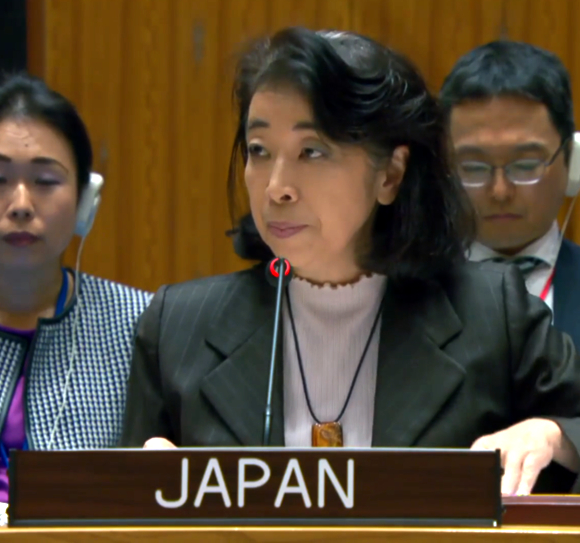
According to Japan, WPS National Action Plans should serve as a comprehensive tool for tracking actions and implementations based on relevant Security Council resolutions on WPS, especially on participation. “I would also like to highlight that Japan’s current action plan especially acknowledges the importance of providing support to gender-based and conflict-related sexual violence survivors, encompassing individuals of all genders and sexual minorities,” said Shino Mitsuko, Deputy Permanent Representative for Japan to the UN.
Shino Mitsuko, Deputy Permanent Representative of Japan to the United Nations. Photo: Screenshot/United Nations.
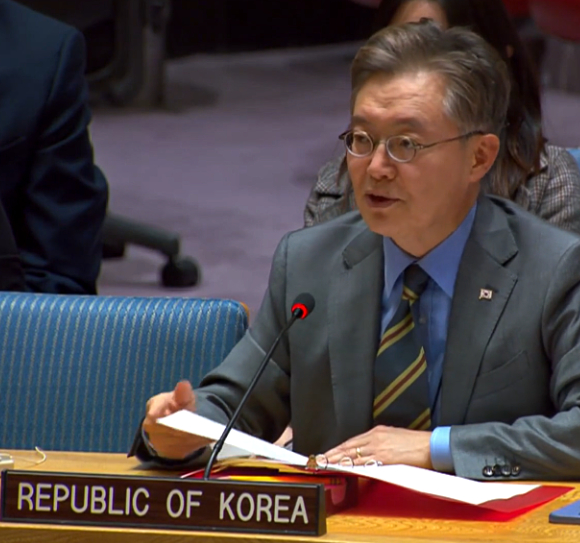
The Republic of Korea called for women peacebuilders and human rights defenders to be provided with necessary resources. “We emphasise the importance of ensuring adequate, predictable and sustained financing for implementation of the WPS agenda. The Republic of Korea has increased its contribution to the Peacebuilding Fund to over USD 4.3 million this year. We will consider further increasing our contribution, both to implement the WPS agenda as well as to advance peacebuilding,” stated Hwang Joon-kook, Permanent Representative of the Republic of Korea to the UN.
Ambassador Hwang Joon-kook, Permanent Representative of the Republic of Korea to the United Nations. Photo: Screenshot/United Nations
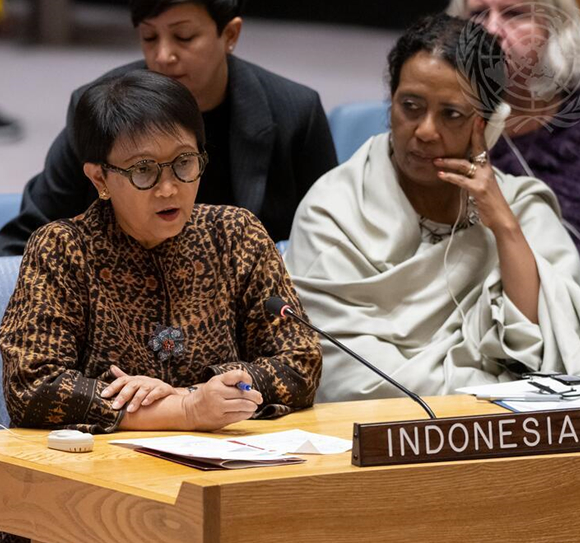
Indonesia also highlighted the importance of investment. “Data shows that women’s participation increases the probability of peace agreements. However, women remain underrepresented in peace processes and are often not equipped for the roles they take in conflict scenarios. Therefore, we must invest more in the role of women, including within the UN system, to ensure a safe and conducive environment for women to succeed and thrive in global peace processes,” said Retno L. P. Marsudi, Indonesia’s Minister for Foreign Affairs.
Retno Lestari Priansari Marsudi, Minister for Foreign Affairs of the Republic of Indonesia. Photo: UN Photo/Manuel Elías
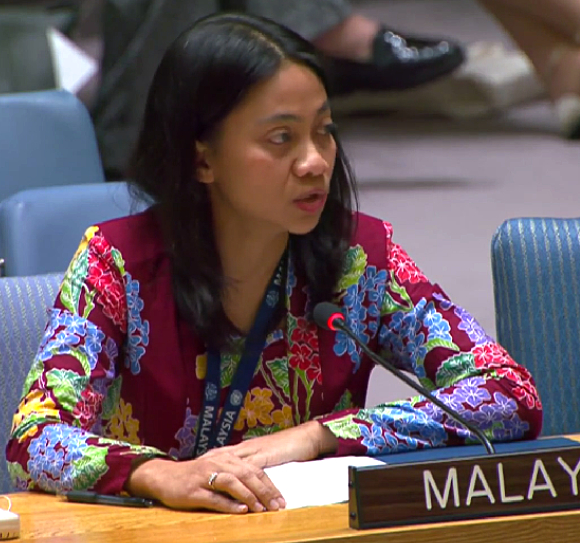
Women will continue to play a key role in Malaysia’s engagement in international peace and security, confirmed Nordiana Zin Zawawai, Counsellor, Malaysia’s Permanent Mission to the UN. “This resolution [1325] and other relevant resolutions, are evidence of the unequivocal trust and confidence that we put in women as agents of change in the maintenance of international peace and security. Today, 23 years after its adoption, it is time that we take stock on the progress and get our priorities straight,” said Zawawai.
Nordiana Zin Zawawai, Counsellor of the Permanent Mission of Malaysia to the United Nations. Photo: Screenshot/United Nations
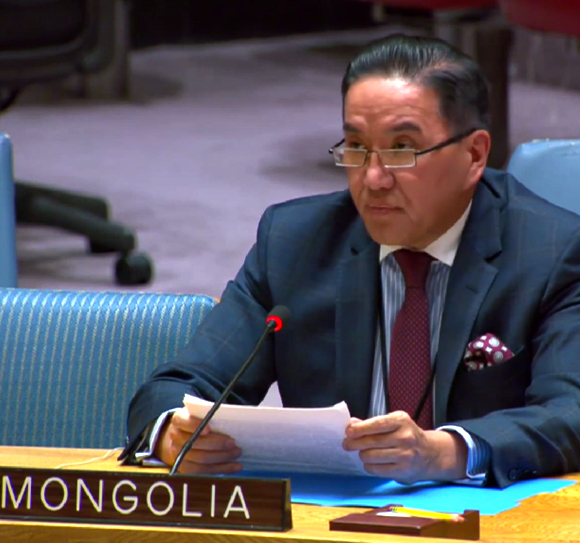
Mongolia emphasised that the current turbulent time required exerting more efforts on engaging all Member States and members of society, including women, into peace and security actions. “Mongolia has been ranking among the top 30 UN troop-contributing countries in the number of women peacekeepers and is firmly committed to meet the call by the UN Department of Peacekeeping Operations to increase the number of women peacekeepers to 15 per cent by 2027,” explained Enkhbold Vorshilov, the Permanent Representative of Mongolia to the UN.
Ambassador Enkhbold Vorshilov, Permanent Representative of Mongolia to the United Nations. Photo: Screenshot/United Nations
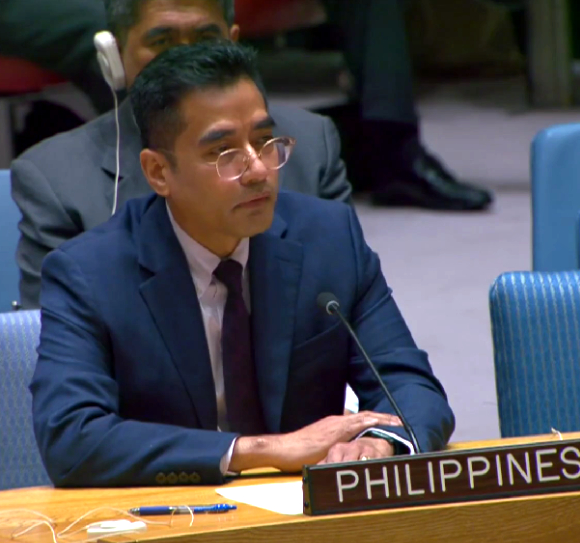
In 2010, the Philippines became the first Asian country to launch a WPS National Action Plan, and WPS remains a priority, said Ariel Rodelas Penaranda, Deputy Representative, Philippine Mission to the UN. “We are now in the process of finalising the fourth generation of our National Action Plan which covers a 10-year planning and implementation horizon from 2023 to 2033. The latest iteration of the plan builds on the lessons learned from previous [plans] and underscores the country’s recognition of the dynamic and complex role that women play before, during and after conflicts, as agents of peace, leaders, survivors and part of the vulnerable sector,” said Penaranda.
Ariel Rodelas Penaranda, Deputy Representative of the Philippines to the United Nations. Photo: Screenshot/United Nations
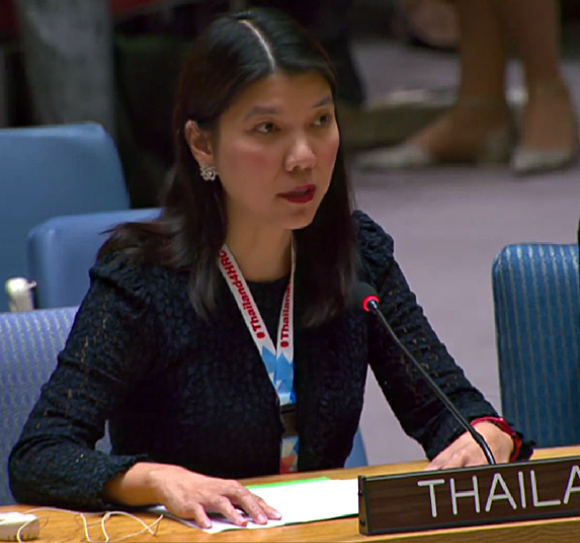
Thailand’s commitment to drive forward the WPS agenda was underlined by Thararut Hanlumyuang, Minister Counsellor, Permanent Mission of Thailand to the UN. “Multi-stakeholder partnership is crucial for putting the WPS agenda into practice. We must continue working with our stakeholders to promote capacity building, harness technological advancement and ensure public awareness and support, with a view to creating an enabling environment for women to take part in peace and security issues and beyond,” said Hanlumyuang.
Thararut Hanlumyuang, Minister Counsellor of the Permanent Mission of Thailand to the United Nations. Photo: Screenshot/United Nations
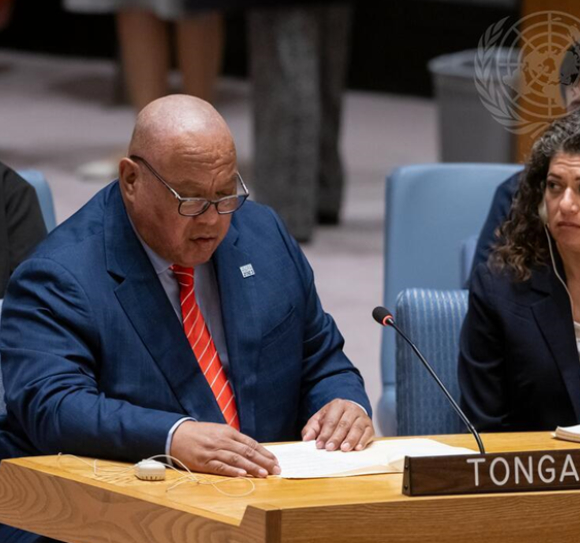
To better support conflict prevention efforts, Tonga proposed that the UN Security Council consider increased collaboration on climate change, including with the UN Peacebuilding Commission, other intergovernmental entities and civil society. “We look forward to continuous engagement with Member States, civil society and development partners in addressing comprehensive crises facing the Pacific in our own way, that would translate and build on our community and traditional ties, and may we translate women’s participation in international peace and security from theory to practice,” explained Lord Vaea, Tonga’s Minister of Internal Affairs.
Lord Vaea, Minister of Internal Affairs of Tonga. Photo: UN Photo/Manuel Elías
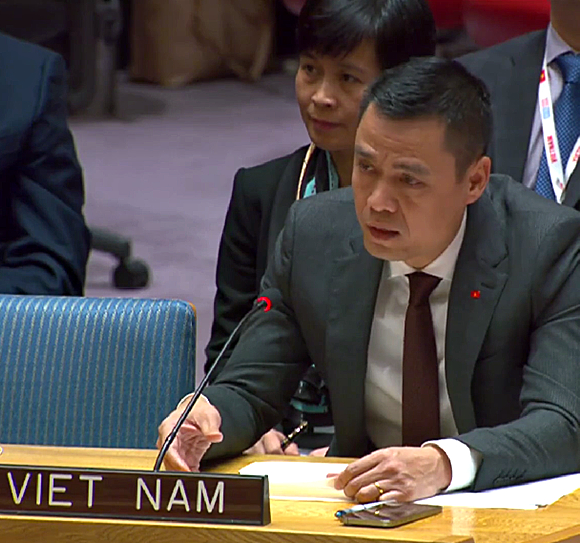
Viet Nam briefed on behalf of the Association of Southeast Asian Nations (ASEAN). “To further enhance women’s engagement for sustainable peace, ASEAN has embraced an all-encompassing approach to women, peace and security from the angle of preventing and countering violent extremism, disaster management and climate change, to women in peace processes and post-conflict rehabilitation. ASEAN reiterates its full support for the WPS agenda,” confirmed Ambassador Hoang Giang Dang, Viet Nam’s Permanent Representative to the UN.
Ambassador Hoang Giang Dang, Permanent Representative of Viet Nam to the United Nations. Photo: Screenshot/United Nations
Advancing the WPS agenda is a priority of UN Women’s Regional Framework Towards Inclusive and Peaceful Societies in Asia and the Pacific, implemented in partnership with the Governments of Australia and the Republic of Korea. For more information, see the Brief on Advancing the Women, Peace and Security Agenda in Asia and the Pacific Region (2022-2027).
More information
- 2023 Annual Report of the Secretary-General on Women, peace and security is available here.
- Read this briefing by Ms. Sima Bahous, UN Under-Secretary-General and UN Women Executive Director, to the UN Security Council annual open debate on women, peace and security, UN Headquarters, 25 October 2023.
- Read UN Women’s expert take on what the Secretary-General’s New Agenda for Peace means for women.
- Read our Guide to UN Security Resolution 1325 and the Women, Peace and Security agenda in Myanmar
The open debate may be viewed on UN Web TV and is available in two parts:
- Part 1 https://media.un.org/en/asset/k1e/k1erz9qv42
- Part 2 debate resumed https://media.un.org/en/asset/k1i/k1i7776qom
Video: